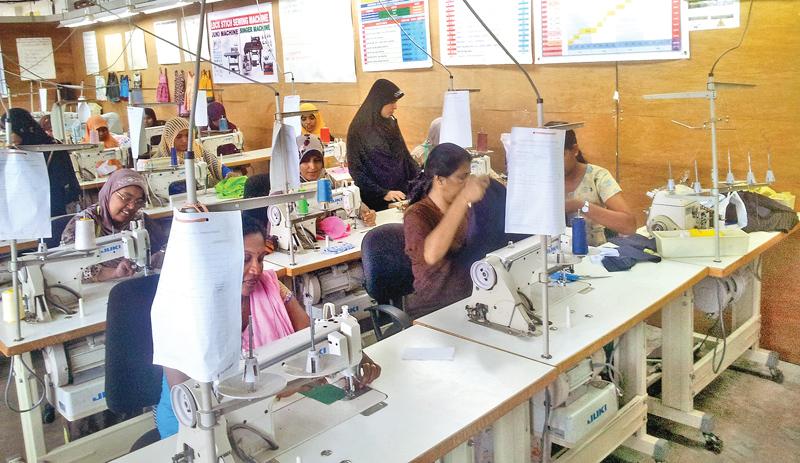
The US$ 1.8 million national apparel initiative which aims to establish 150 mini garment factories islandwide at village level is expected to come to fruition by June 2018 by adding approximately 3,000 skilled people into the garment industry workforce, a senior official said last week.
Under the program designed to encourage small and medium scale women entrepreneurs, rural women have been selected through a transparent method with priority given to those who belong to displaced families and those who became widows due to the civil war.
“The objective is to bring the women into self-employment in the apparel and handloom sectors by starting their own business after the training period is over.
Two factories are currently up and running in Matara and Kegalle while about 76 factories, which have started training students are due to be completed by end of this year,” CEO/Director General of Sri Lanka Institute of Textile and Apparel, A. Robert V. Peries said.
 According to him, the training period lasts for six months with selected women first undertaking training in tailoring by SLITA. Thereafter, the National Entrepreneurship Development Authority (NEDA) and the Industrial Development Board (IDB) trains the women in entrepreneurship development and provides them with guidance on market linkages. On the other hand, assistance in designing is provided by the National Design Centre and the Jathika Shilpa Sabawa.
According to him, the training period lasts for six months with selected women first undertaking training in tailoring by SLITA. Thereafter, the National Entrepreneurship Development Authority (NEDA) and the Industrial Development Board (IDB) trains the women in entrepreneurship development and provides them with guidance on market linkages. On the other hand, assistance in designing is provided by the National Design Centre and the Jathika Shilpa Sabawa.
“The SLITA has so far trained 135 trainers by conducting a 20-day Training of Trainers (ToT) program in both Sinhala and Tamil languages. Once the ToT program is complete, the ToT participants are expected to fully train the women at village level,” Peries said explaining the modality of the program.
He added that trained women will thereafter form their own textile cooperative or business partnerships with regional buyers through supply sub contracts. Speaking to the Sunday Observer, Chairman of the Sri Lanka Institute of Textile and Apparel (SLITA) M. A. Thajudeen said the project, which is centered around 20-women strong small scale ‘mini’ apparel factories, has higher goals to produce high quality apparels later on rather than handlooms alone and to become part of world class global apparel supply chain that Sri Lanka is reputed for.
“The aim of the initiative is for the factories to produce and export high quality apparel. Each facility will be equipped with a range of high end industry standard apparel machines,” Thajudeen, who is also the Additional Secretary of Textile Industry Development and SME Development Department at the Ministry of Industry and Commerce, said.
Locations
A special feature of the project is that nearly half of all mini factories are dedicated to the war widows of Northern and Eastern Provinces.
Out of the 150 factories, around 73 are dedicated for conflict affected families and have been approved to be set up in the Northern and Eastern provinces.
Of the 73, 38 will be in the Northern province while 35 in the Eastern province. The factories in Northern province comprises of 13 in Vavuniya, 15 in Mannar, seven in Mullaitivu and three in Jaffna.
On the other hand, 25 factories have been approved to be set up in Ampara, 10 in Trincomalee and three in Batticaloa.
At an event held a fortnight ago, Minister of Industry and Commerce, Rishad Bathiudeen opened one of the centres at Menik Farm Village close to Vavuniya.
According to a statement issued by his Ministry, Sri Lanka has transformed the war-time displacement camp that housed nearly 300,000 Internally Displaced Persons (IDPs) at the conclusion of the war in May 2009 into an apparel village with garment factories.
“We want these 150 factories to form their own apparel companies or cooperatives one day and share their profits among them. Reconciliation would be a distant dream without provision of livelihood to war affected families,” the Minister said addressing the gathering at the opening ceremony.
Machinery
Each factory is provided with a range of high end apparel machinery that are industry standard in Sri Lanka. The factories will be equipped with machinery comprising of 15 single needle machines, 03 five thread over lock machine, one, four-thread over lock machine, and one button-hole machine.
“Once the factories are up and running, although the government will provide the necessary machinery for manufacturing, other raw materials needed to supply orders would have to be brought in by the entrepreneurs,” the SLITA Director General and CEO said.
Sri Lanka’s export-oriented production of clothing (readymade garments) began in 1970s and expanded rapidly after the liberalisation of the economy in 1977.
In 1992, the BOI offered an attractive incentive package to all garment manufacturers to move into the rural areas of Sri Lanka under 200 garment factory program which is still considered as the turning point of the apparel industry.
